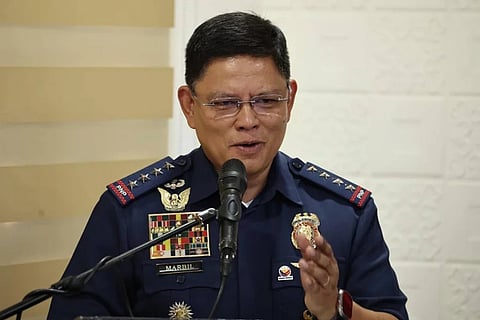
- NEWS
- the EDIT
- COMMENTARY
- BUSINESS
- LIFE
- SHOW
- ACTION
- GLOBAL GOALS
- SNAPS
- DYARYO TIRADA
- MORE

Philippine National Police (PNP) chief Gen. Rommel Francisco Marbil said on Sunday he has ordered an investigation Lt. Col. Jovie Espenido’s claim that cops were given quotas and rewards to kill drug suspects during the Duterte administration’s so-called war on drugs.
Marbil said Espenido’s allegations — echoing those made before the International Criminal Court (ICC) — are serious, particularly because they come from an active police official.
“We take these allegations with the utmost gravity. They have raised significant public concern, and we assure the public that a thorough investigation will be conducted as part of an ongoing comprehensive assessment and evaluation by the PNP’s oversight bodies,” Marbil said.
He added he had created a PNP review panel composed of members from the Office of the Deputy Chief PNP for Operations, the PNP Quad Staff, the Internal Affairs Service and the Human Rights Office.
“This panel has been tasked with thoroughly assessing and evaluating Oplan Double Barrel, including Lt. Col. Espenido’s disclosures,” Marbil said.
The review panel would determine specifics of the Duterte anti-drug campaign in relation to human rights, operational protocols and accountability mechanism.
Marbil said the review would ensure that past operations adhered to legal standards and ethical guidelines.
“Our objective is to address any concern and ensure that the PNP’s anti-drug operations are conducted in a manner that upholds the rule of law and respects human dignity,” Marbil said.
PNP future
“The findings of this review will be crucial in shaping the PNP’s future strategies in the fight against illegal drugs, with a focus on transparency, accountability, and the protection of human rights,” he added.
The campaign, which Duterte launched shortly after taking office in 2016, has been linked to thousands of deaths, many of which human rights groups claim were extrajudicial killings.
The ICC’s probe follows a series of complaints filed against Duterte, accusing him and several high-ranking officials of orchestrating a systematic attack on the civilian population under the guise of combating illegal drugs.
The investigation focuses on allegations that law enforcement officials carried out widespread executions without due process, particularly targeting low-level drug users and small-time dealers in impoverished communities.
While the Philippine government officially acknowledges around 7,000 deaths in police operations, independent observers and human rights organizations estimate the death toll could be as high as 20,000.
In 2017, a Filipino lawyer filed a formal complaint with the ICC, accusing Duterte of crimes against humanity. The complaint detailed numerous instances of extrajudicial killings and argued that Duterte’s public rhetoric encouraged a culture of impunity among law enforcement.
ICC withdrawal
In February 2018, the ICC announced a preliminary examination into the situation in the Philippines. This examination was the first step in determining whether there was sufficient evidence to launch a full investigation into the alleged crimes.
Duterte and his administration have consistently denied the allegations, insisting that the war on drugs was a legitimate law enforcement operation aimed at protecting the public from the scourge of illegal drugs.
In response to the ICC’s actions, Duterte announced in March 2018 that the Philippines would withdraw from the ICC, a process that was completed in March 2019.
Despite the withdrawal, the ICC maintains that it retains jurisdiction over crimes committed while the Philippines was still a member, covering the period during which the anti-drug campaign was most active.
In September 2021, the ICC took a significant step by authorizing a full investigation into the alleged crimes committed during Duterte’s drug war.
The court’s prosecutors argued that there was a reasonable basis to believe that crimes against humanity had occurred in the Philippines. However, the investigation was temporarily suspended in November 2021 after the Philippine government requested a deferral, citing its own investigations into the alleged abuses.
